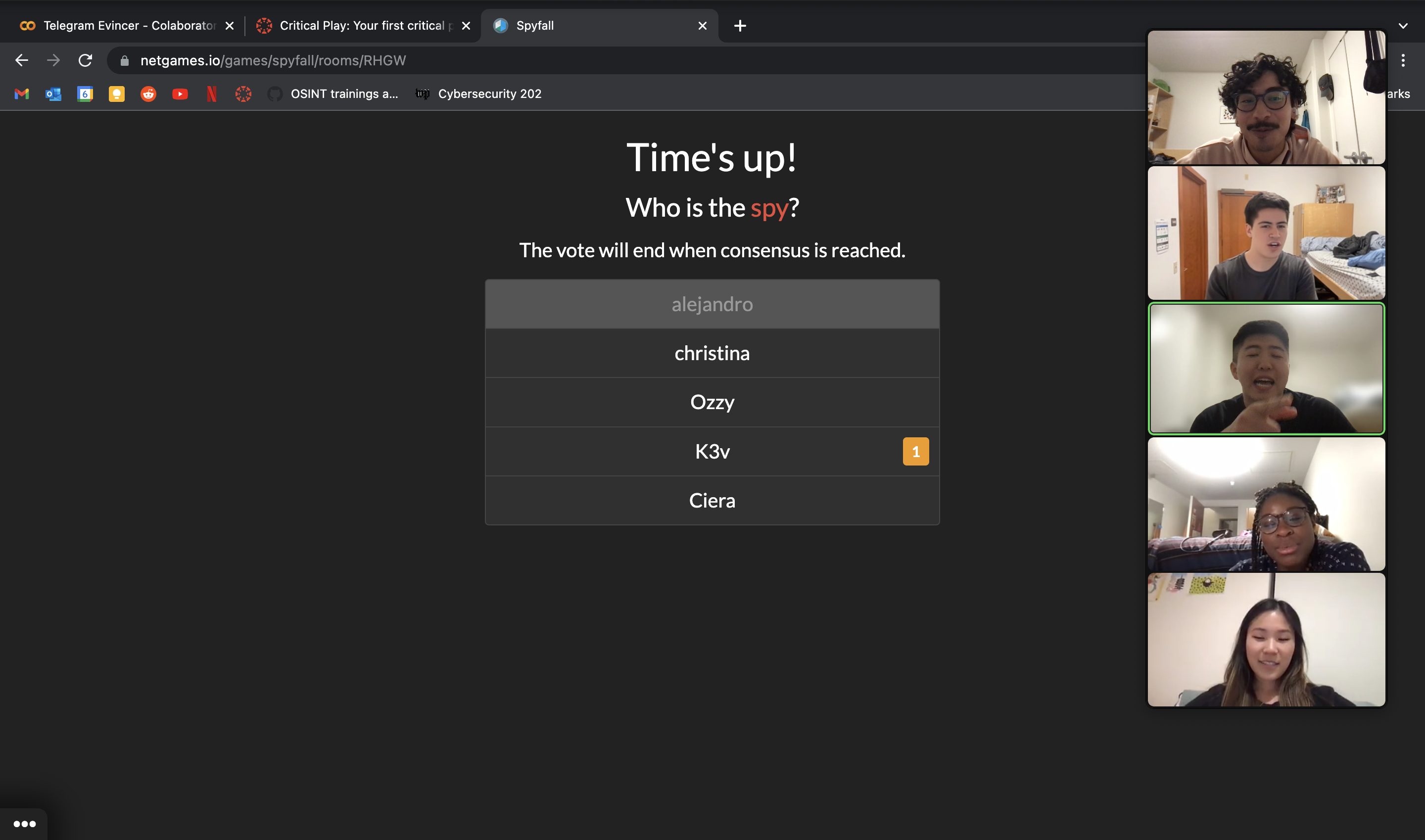For this week’s critical play, I played Spyfall with a few folks from our CS 247G section! Spyfall — in the version we played — is a free browser-based unilateral competition game published on Netgames. The original version of the game was created as a card game by Alexandr Ushan and Hobby World in 2014.
The documentation for the original version of Spyfall indicates that the game is intended for 3 to 8 players of age 13 and older (though I’m sure the game would be suitable for children younger than 13). The game has a fairly wide intended audience — the theme and aesthetic of the game is minimal and hardly affects the gameplay itself.
As mentioned, Spyfall is a unilateral competition game played with 3 to 8 players. Each round is played by two factions — a single spy and the remaining group of players (non-spies) — at some given “location”. The objective of the game is for the spy to deduce the location that the non-spies were provided, while the non-spies aim to determine which player is the spy.
The game progresses as such: each player is given the opportunity to ask another player some question pertaining to the target location. The responding player must then answer the question as if they were truly at the target location — unless they are the spy and thus have no knowledge of the location. This question-and-answering session continues until five minutes have elapsed. At this point, the non-spies must guess who the spy is. If the non-spies do not correctly identify the spy, then the spy wins automatically. If the spy is correctly accused, then the spy may guess what the target location was — if the spy is correct with their guess, then they win. Otherwise, the non-spies win.
Spyfall is similar to other games in this category of social unilateral competition games in that a subset of the players have hidden information that the other players must appropriately deduce. It is unlike games like Mafia and Secret Hitler in that the rounds are time-boxed and incorporate an orderly method of questioning other players. The players are also limited to just two distinct actions — questioning and answering.
I don’t find Spyfall to be better or worse than games like Mafia and Secret Hitler — to me, they are just different games with their own distinct pros and cons. Spyfall is a much more accessible game that does not require the players to invest a ton of time to play a full game or a ton of mental energy to understand the procedures. That said, I find that the “magic circle” created by Spyfall is less compelling than in Mafia or Secret Hitler — in which you must truly embody the role you are assigned.
I really enjoyed the game! I’m a huge fan of this genre of game that incorporates hidden information, deception, and deduction. I think these factors are what make these kinds of games fun — every player is actively trying to either deduce or deceive the others from the moment the round begins to the moment it finishes. The thrill of trying your best to achieve either goal keeps the game spicy. As the spy, the shroud of secrecy works in your favor to delay the deduction as long as possible. As the non-spies, that same shroud works antagonistically and keeps you guessing until the very end. I appreciate the social aspect of the gameplay as well. Each player is constantly making assessments as towards the character and veracity of the others. This task is fun regardless of if you know the other players well or not — friends are humorously (un)predictable, while strangers are nebulous wildcards. I enjoy being able to interact with the other players towards the game objectives — probably since the game mechanics mimic our natural desire for status as social animals.
I also appreciate this game’s propensity for creating moments of “ooh”s and “ahh”s. Players who give suspect answers to questions merit an “ooh”, whereas players who give cleverly valid answers merit and “ahh”. Mistakenly accusing a non-spy as the spy elicits a collective “ooh”, while the revelation of the spy’s true identity is almost always followed by a collective “ahh”. These moments contribute to the rich zestiness of the gameplay.
As much as I enjoy deception, I often find the role of the spy to be much more stressful than playing the non-spies. I think this is because the non-spies — with their collective knowledge — are able to give answers more quickly and confidently than a spy at all stages of the game. A spy may only find that confidence later as they narrow down on the target location. Thus, I think the game could benefit from the addition of more ambiguity for the non-spies. If I could modify the mechanics of Spyfall, I might add a “jester” role whose objective is to simply confuse the other players. I’d also consider adding the possibility of a “scatterbrain” role — a player who is allied with the non-spies but is given a false location or otherwise doesn’t know the target location. These roles add more ambiguity to the game, making the spy’s lack of confidence less glaring and making the non-spies work a little harder.



